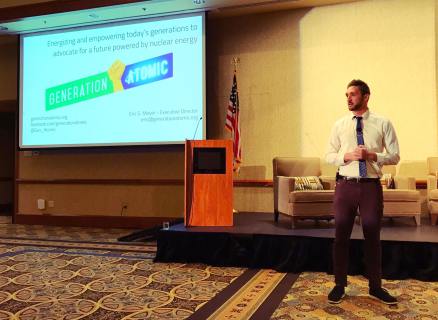Written by Northwest Clean Energy Blog
June 26, 2017

But Eric Meyer is a man of many talents, opera being but one (B.A. in Vocal Music). Grassroots advocacy is another, hence his founding of Generation Atomic. His talk to the Northwest Public Power Association in Sunriver, Ore., this spring showed how direct outreach to people is helping build support for nuclear energy in the places it is needed most – currently Ohio. There, two nuclear energy plants are facing difficult times due to deregulated energy markets that don’t adequately value reliable and carbon-free electricity.
“We deregulated the energy markets thinking the only thing that mattered was price to consumers,” Meyer told me. “Then we realized that wasn’t the whole story. We care about clean energy. We care about reliable energy.”
Getting started
Meyer hadn’t thought much about nuclear energy growing up and admits he probably had a vague disrespect for it because of watching The Simpsons. But in 2009, a friend sent Meyer a video on molten salt reactors.
“(I)n that video they talked about other reactor designs and how with nuclear you can do things that you can’t do with other energy sources, like make carbon-neutral synthetic fuels, desalinate water and, just in general, have reliable electricity that doesn’t harm the environment.”
That opened his mind to the concept of nuclear energy being a good thing. So he changed his education focus to public policy and advocacy and a year ago jumped into nuclear advocacy with both feet.
“(Pro-nuclear environmentalist) Michael Shellenberger invited me to come out to Berkeley and help organize a pro-nuclear climate march, the March for Environmental Hope. We had three big events and were able to build some momentum,” Meyer said.
Meyer felt more could be done on a grassroots level – and that more should be done to begin building the base of nuclear energy support. So Meyer started Generation Atomic with Tay Stevenson using campaign-style tactics that had worked for them before, such as in Minnesota building support for gay marriage legislation.
“There’s always been a small contingent of pro-nuclear people, people who work at the plants, or your enthusiasts, who haven’t had an opportunity to go into communities before,” Meyer explained. “There’s never been a door-to-door operation for nuclear. There’s been these efforts for clean water, renewables. You go back 30 years and the public wasn’t calling their legislators demanding renewables standards or subsidies. That took a grassroots effort.”
Generation Atomic is so grassroots that for the Ohio campaign, six people shared a Sandusky duplex and slept on air mattresses. “I don’t think we could have made it more clear how grassroots we were.”
While the accommodations weren’t fancy, Generation Atomic is running a sophisticated operation. Volunteers go door-to-door with a smart phone app that allows potential supporters to find their own path to why favoring nuclear energy is a good thing. And it works. Nearly 60 percent of residents they speak with sign on to the cause, according to Generation Atomic, and nearly 54 percent will take action.
Screen shots from the smartphone app Generation Atomic developed for volunteers.
“The plant workers get it. The enthusiasts get it. The climate scientists get it. But the public at-large is either not thinking about it or has their perception colored by the media in general,” Meyer said. “The general message (for canvassers) is, ‘nuclear is good for your community in these different ways.’ What’s most important to you?”
Those ways may be jobs, school funding or environmental benefits. “People don’t understand they like nuclear until they understand the implications of losing it.”
Generation Atomic is benefiting from, well, a generation of Americans who see nuclear through a different lens. It’s not about a missile crisis, fall-out shelters or doomsday clocks. They understand technology and how it can help society; it’s comfortable. The only doomsday clock they worry about relates to the climate. For them, nuclear energy is a solution. A good one.



